This week, the Maine State Grange holds its annual conference in Skowhegan.
What, you didn’t know?
Once upon a time, you absolutely would have known, because Grange was an integral part of Maine rural life, a gathering place for farmers and community members to share news, information and concerns. If you worried about being able to afford insurance or being ripped off by the railroad monopolies taking your agricultural products out of Maine, or just wanted to slough off your cares by going to a dance, you turned to the Grange. It did cooperative buys on insurance and seeds, lobbied Washington on your behalf and could always be relied on to feature a big empty room with a fine dance floor.
The ritual heavy, Christian-oriented and unusually progressive Grange (female members got the vote long before the rest of American women did) was the original Facetime for farmers. Or rather, “Grange.” Like Farm Bureau, Grange hardly needed an article. But consider this: The 2015 Maine State Grange conference is not being held at Skowhegan Grange, because declining membership caused that to close several years ago, although the building was saved and is being rehabbed.
There are two trends in Maine Granges. One is positive: Young or younger farmers are taking an interest in revitalizing the institution, fixing up old buildings; adding bathrooms where there were none; hosting farmers markets and contra dances; sharing Grange space with entertainment, as at the Wayside Grange and Theatre in Dexter; and returning to the cooperative model for better buying power for local farmers, hobby or hard-core, as at the Halcyon Grange in North Blue Hill.
But the second trend, the negative one, are Granges shutting for lack of membership, and that decline still outweighs the positive.
Only 120 active Granges are left in the state; about 50 have been shuttered in the last decade. According to the Maine State Grange historian, Stan Howe, during Grange’s heyday in Maine there were 419 local Granges and about 200 subordinate (really local) Granges with roughly 60,000 members statewide. It’s said that the Houlton Grange had 20,000 members at one time. Or 16,000. Howe, 72, a fifth-generation Granger who joined at age 14, believes both numbers are inflated. But Houlton Grange was the largest in the state and maybe even the nation.
Mainers were so enthusiastic about Grange that 64 of them were built in 1873, the first year the National Grange of the Order of Patrons of Husbandry (that’s the official name) came to the state. Howe said a debate even arose over which new Maine Grange got to be the first, Lewiston or Hampden – the number affixed to a Grange name indicates when it was added to the state roster. Hampden’s Eastern Star Grange No. 1 got the distinction.
Eastern Star Grange is closed and now under the ownership of Maine State Grange. Membership in Houlton Grange dipped below 13, the magic number for keeping a Grange alive, and was closed two years ago, according to Maine State Grange Master Vicki Huff. The Lewiston Grange is shuttered as well. Aside from dairy farms, Grange may be Maine’s most rapidly dwindling institution.
The old fight was about being first. The new one is about making sure no one has to worry about being the last.
ENDANGERED SPECIES
Vicki Huff became the first woman to hold the state leadership position of master in 2013; her predecessor passed away in office, and she inherited his position. Since then, she was elected for a two-year term that expires at the conference. She’ll take the position again if her fellow Grangers want her to because she values the organization so much. But she also recognizes it is in trouble. “We have had a decline,” she said simply. Membership stands at “around 4,000.” Despite some new and re-energized Granges, she said, “I can’t say that we have had a net gain in membership. A good majority of our Granges are not doing that. And the Grange age itself is just getting older.”
How old?
“The average age is probably between 70 and 80,” she said. She’s 53. A youngster.
Grange welcomes everybody; they’ll embrace a librarian just as happily as they would a dairy farmer. But the group’s strongest connection is to agriculture. One would think that in Maine, where the demographic gaining ground is the young farmer, there would be opportunities to recruit that sweet young couple down the road making cheese, or those former MOFGA interns trying to grow artichokes up the hill. The dues tend to be inexpensive ($20 to $30 a year). And while that younger demographic has joined Grange in a few places, like in Montville, North Blue Hill and Whitefield, they are in the minority.
Huff thinks Grange undersells itself. It’s not a good self-promoter. It’s modest, humble, old-fashioned. It does good works – raising money for scholarships, giving out dictionaries to third-graders and cleaning up cemeteries – but doesn’t mouth off about it.
“We do the things we need to do, and we don’t look for the accolades,” she said. Those looking at the Grange from outside might notice that sign for an occasional bean supper, but mostly “they see that building that maybe the lights are on once or twice a month, and they see what those folks do within the community.”
It’s hard though, she said, to get even the most die-hard Grangers to solicit new members. “People don’t like to hear the word ‘no,’ ” she said. “And nine times out of 10, they will say no.”
JUST SAY YES
Phil and Heather Retberg said no six times. To a persuasive senior citizen no less. Flossie Howard of Blue Hill was, along with her husband, the local source for raw milk. “When folks would come in to get milk, depending on who you were, you would hear Flossie call to you for a sit-down,” Phil Retberg said. “Getting milk was usually an hourlong ordeal.” He said this in the manner of a man who enjoyed this ordeal.
Howard died at 81 in 2012, but not before she recruited a number of young (or younger, like in their 50s) farmers to join the Halcyon Grange in North Blue Hill. As far as 21st-century Granges go, it is a raging success. In 2014 Halcyon received a food sustainability grant from Maine Farmland Trust and added three grain bins. Those bins service about 30 farms and homesteads in the area at savings of 25 to 30 percent, Phil Retberg said. It’s an old model made new again.
“Last century it was quite common for the Granges to have a grain store where folks would get together and buy in bulk, from flour to a keg of nails,” he said.
Architecturally, most Granges are similar, with a kitchen and dining room downstairs and a stage and meeting room upstairs. Few had heat, many had outhouses, most had kitchens. At Halcyon Grange, another point of pride is a new commercial kitchen, which will soon be available for rentals. Farmers who want to make value-added products will be able to use it. Grange is a time commitment for the Retbergs – he’s the steward, she’s the master – but it enables them to have a voice statewide. One of the issues they care deeply about is food sovereignty, and at the state conference they’ll put forward a resolution in favor of Maine municipalities being able to govern themselves when it comes to controversial issues like the sales of raw milk.
SIX DEGREES OF SEPARATION?
The question becomes, why isn’t more of this happening around the state? The answer is complicated by the fact that most Maine Granges are at least 100 years old. They need new roofs or bathrooms. Arlington Grange in Whitefield is in the process of installing a septic system; until now it has relied on outhouses. Using Granges for winter farmers markets is a fine idea and is happening in places like Farmington, which also had a new commercial kitchen. But since most Granges don’t have heat, it’s a chilly prospect.
Bonnie Clark, who has a small diversified farm, joined Farmington Grange (it’s No. 12 and 135 years old) about five years ago and helped fundraise and apply for grants that brought in about $40,000 to renovate the building, including putting in three pellet stoves. “It did enable us to keep it open without spending megabucks on oil,” Clark said.
Farmington Grange has about 100 members, she said. “But that is people that pay the dues,” Clark said. “Maybe 10 come on a regular basis, and five or six are really active. A lot of people think it is cool to be a member but never darken the door, so to speak.”
“All the Granges are pretty much in decline,” she said.
The reason is likely the more eccentric traditions of Grange. Secret passwords, devised to keep out the spies from the railroads back when Grange was about fighting for fair deals from monopolies. Mason-like rituals (the founder of Grange was a Mason). Bibles. Archaic language. Promises that you’ll keep Grange secrets safe. Members move up through layers of learning, from say, fourth degree to sixth degree. It’s a complex clubhouse.
“When they come and see a ceremony, they get kind of freaked out and don’t want anything to do with it,” Clark said.
BACK TO THE FUTURE
Even Howe, the Grange historian, who published a book about Maine Granges in 1994, understands the problem.
“We don’t talk like they did in the 1860s,” he said. “There are a lot of expressions that sound stilted and awkward. … I keep telling people we should have a language change and bring the Grange out of the 19th century and into the 21st.”
It’s possible that the ritual and the archaic language – master, lady steward, sixth degree – is partly to blame for a conflict between the California Grange and the National Grange that resulted in an expensive, lengthy lawsuit – it was settled in late September. The dispute was over a splinter group that was using the word “Grange” in its new name and argued it was a generic term. The court ruling was in favor of the National Grange.
But the roots of the fight started earlier. The California Grange had revitalized and grown together around organic issues. While the Grange was successful in bringing in new members, political efforts to lobby in favor of labeling of GMO foods apparently caused tension between the national and state group. When the state master was suspended from his duties by the national master for undisclosed reasons, there was an uproar.
“I have been so disgusted about it,” Howe said. “Someone should have knocked their heads together,” he said, referring to the dueling masters.
“They won but it was a Pyrrhic victory because they nearly bankrupted National Grange to do so,” he added.
Howe says California had been a leader in National Grange. It was the only state to show net gains in membership in recent years. (Maine is far from the only state struggling to keep its Granges going.) Had the old Grange been trying to modernize the group? Pull back on rituals? The secrecy of the group makes it hard to say, but for Grange members in Maine that seems a likelihood.
“The way the charter for the Grange is written and instituted, you have to stick to all of the old ceremonies,” Clark said. “They will not allow this to be altered. That is a big kicker.”
Not every new member finds the rituals off-putting. Greg Hills and his wife, Abbie, helped bring Union Harvest Grange in Montville back to life in 2013. He’s 48. He’s proud that his Grange is the newest, and agewise the youngest, in Maine. He gets that the rituals are a turn-off for some. “But on the flip side, I think history is important,” Hills said.
“The only objection I have ever heard is there is a little religious component,” he added. “We say ‘creator,’ but we don’t say ‘God’ or whatever.” And they abbreviate the ritual somewhat. “But when it is done well it is actually nice to see. … The ritual is kind of what binds us. Other than that, we could just hold a meeting at someone’s house around someone’s kitchen table.”
In Whitefield, where young farmers are moving into town, many of them second-generation locals moving back after time away, like Ben Marcus, who runs the Sheepscot General Store with his wife Taryn, there were initially some generational clashes. Elders who had grown used to having community suppers that weren’t exactly made from local ingredients butting heads with those who wanted kale salad, not iceberg. That kind of thing.
“It was difficult,” said Debbie Rogers, 58, who lives next door to the old Grange, doesn’t farm, but along with her husband, Dana, was seeking community and a way to save a beautiful building. They joined three years ago. “But we have gotten over that hurdle, and they are very much on board with us now.” The Grange is small, but 24 members strong. And their next fundraiser? A calendar featuring young farmers.
Send questions/comments to the editors.



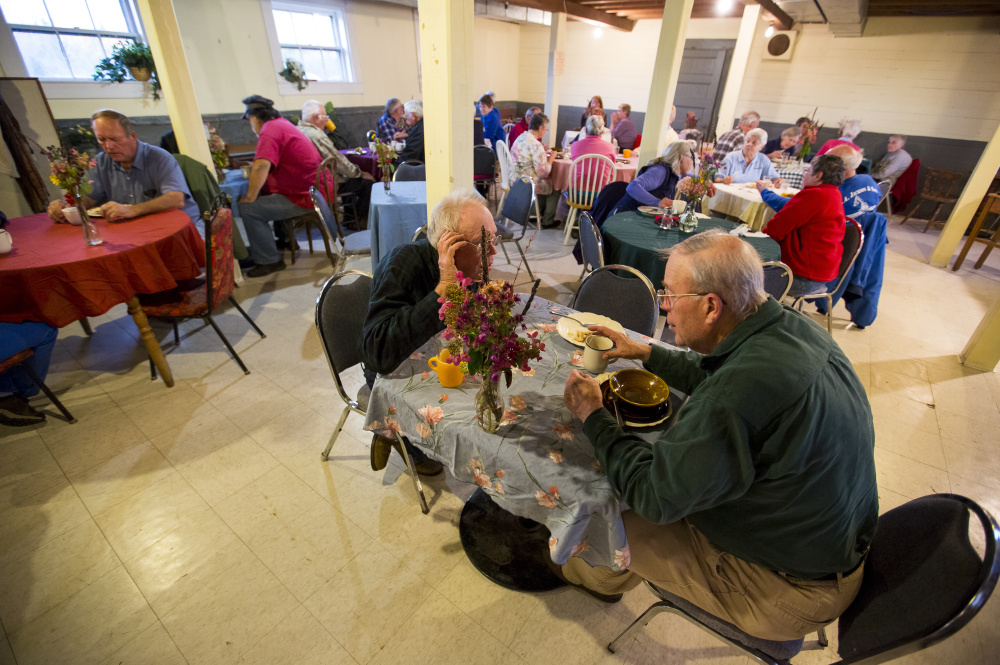
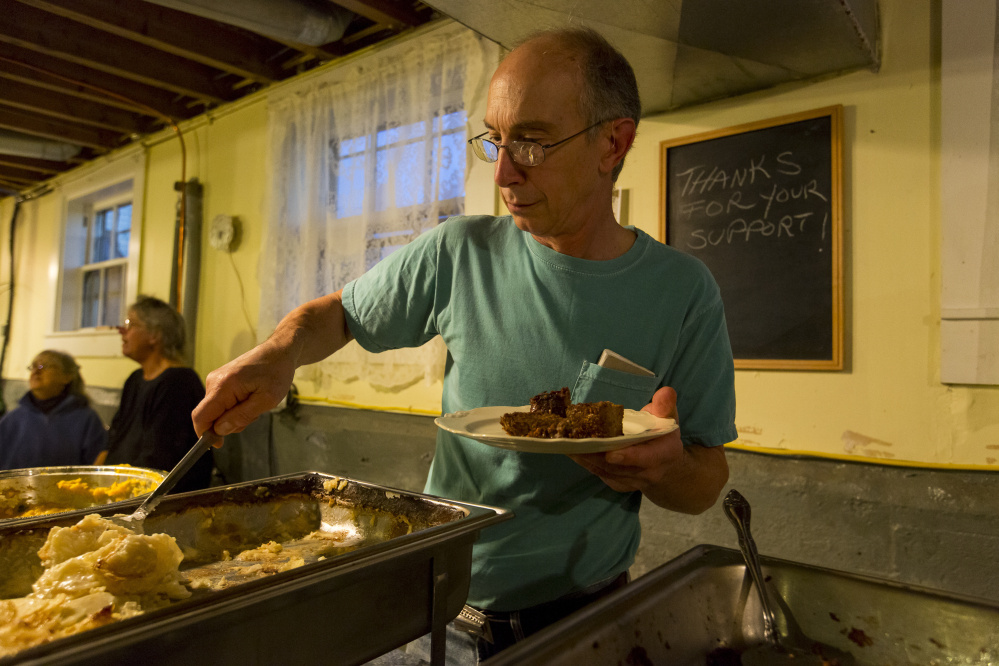
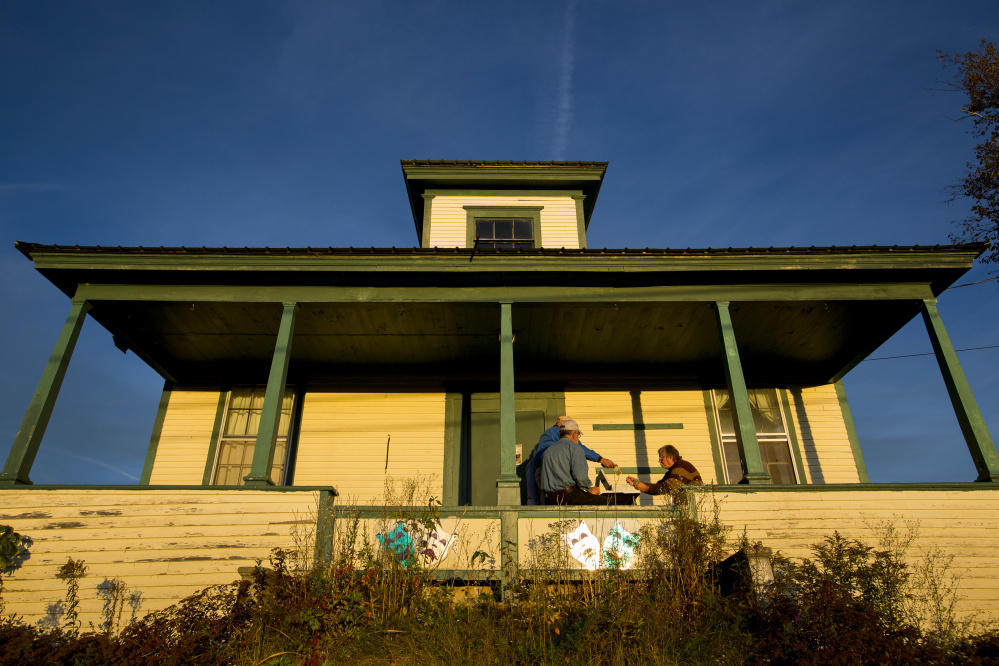
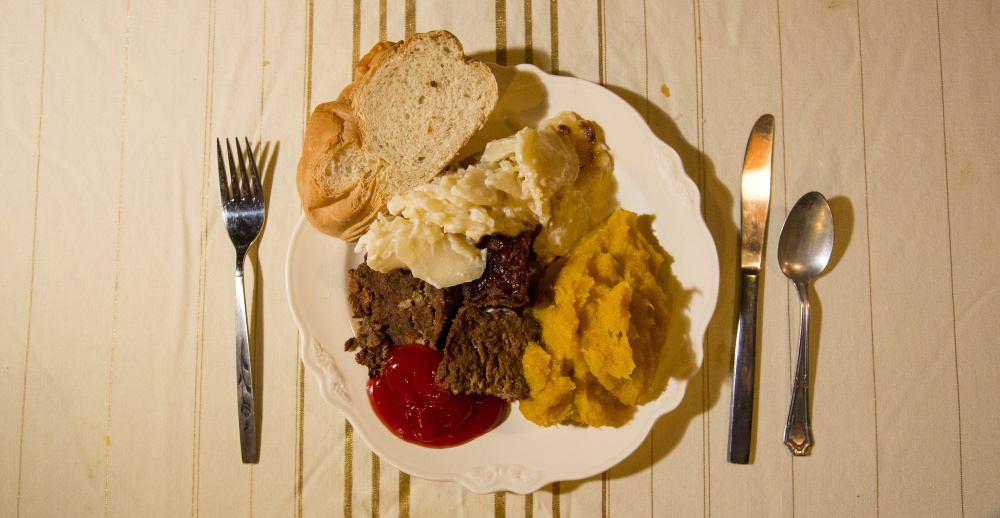
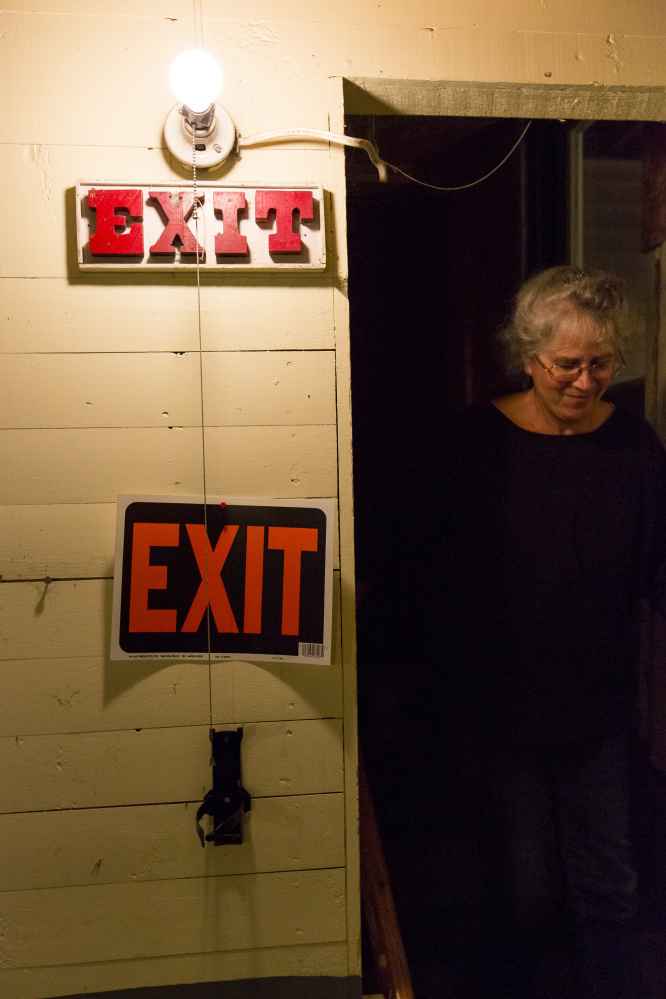
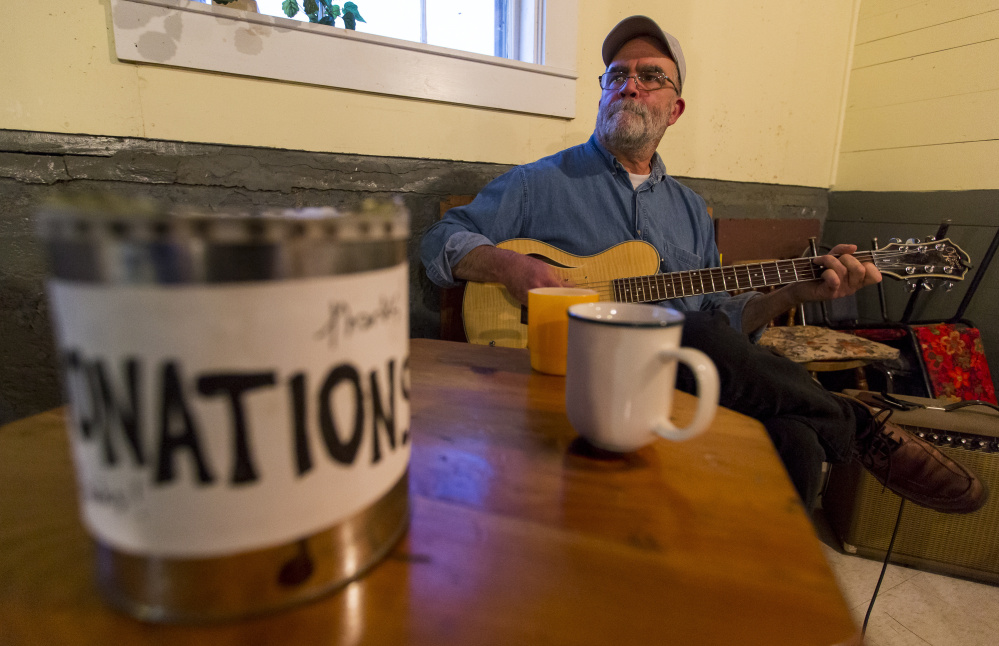

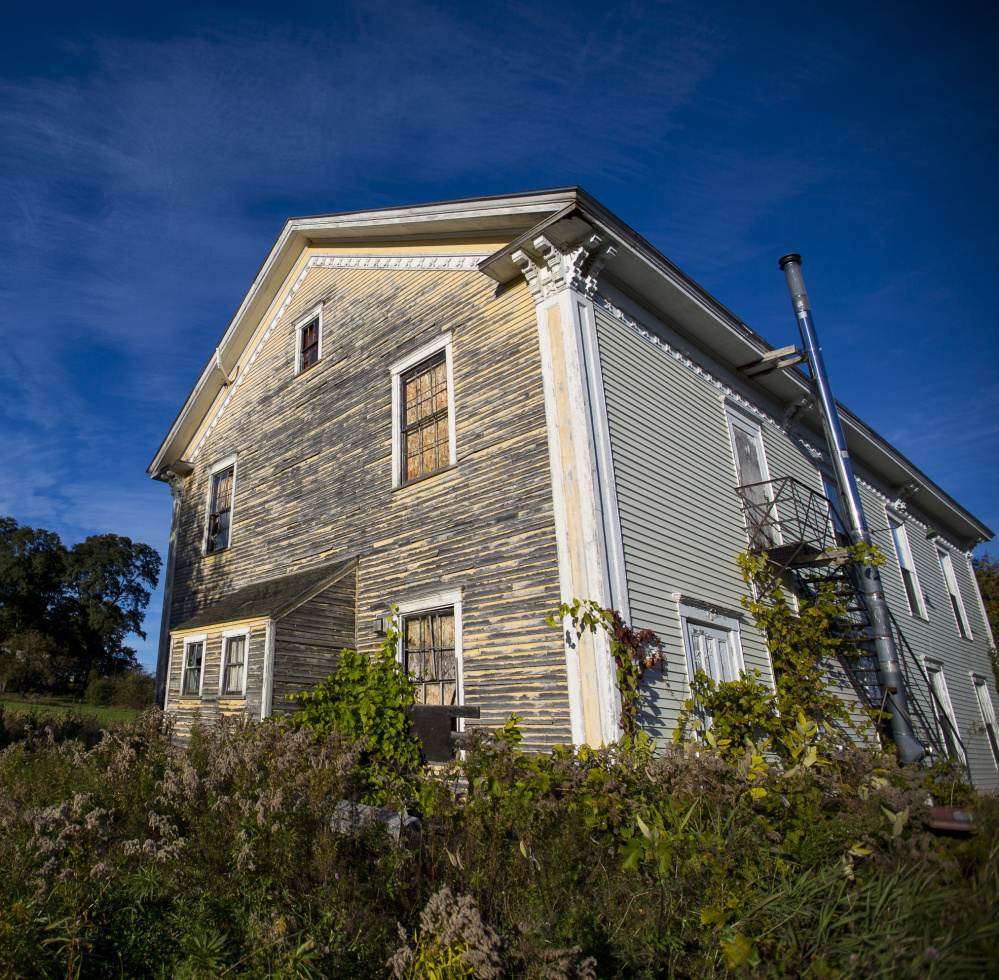

Comments are no longer available on this story